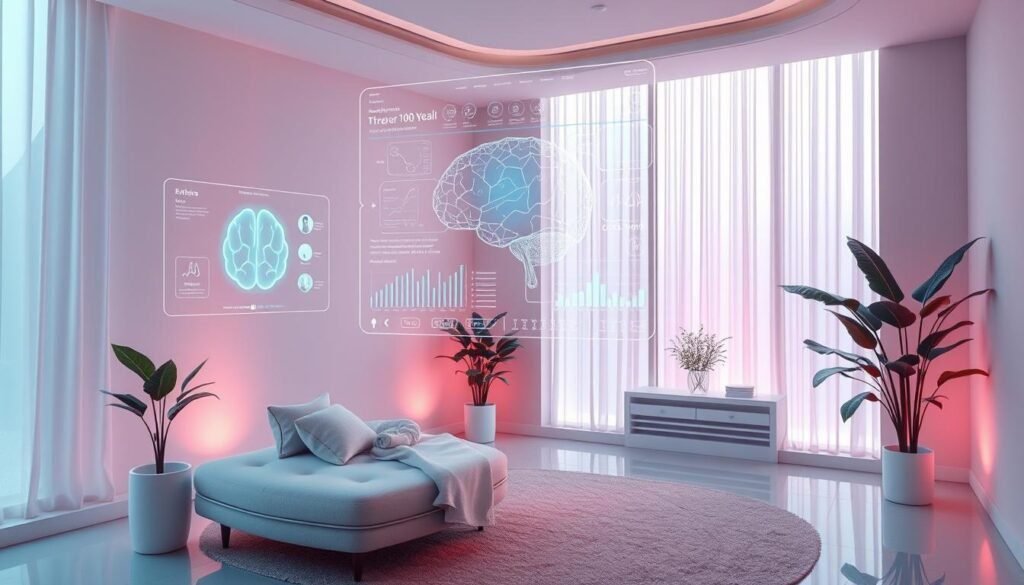Exploring how artificial intelligence is changing mental health care, I’ll give you an update. AI is making big strides in mental health apps. These apps are showing great promise in helping people.
Studies show AI is improving mental health results. It’s becoming more popular in mental health care. Experts think AI could change how we treat mental health forever.
Introduction to AI in Mental Health
AI is helping mental health professionals give better care. This leads to better results for patients. As AI advances, it’s set to be a key player in mental health treatment’s future.
Key Takeaways
- Artificial intelligence mental health Treatment is revolutionizing the field of mental health treatment
- AI for mental health progress is showing promising results in improving mental health outcomes
- Artificial intelligence mental health apps are becoming increasingly popular
- The use of AI in mental health is a rapidly growing field
- AI has the potential to provide more personalized and effective care for patients
- AI for mental health progress is expected to continue in the coming years
The Current State of AI in Mental Health Care
Exploring AI in mental health care shows us that old ways have limits. High costs and hard-to-reach care are big problems. But, new AI technologies offer hope.
Digital support is key now, and AI is being tested to help. It could change how we get mental health care.
Traditional treatments often need human therapists, which costs a lot and takes time. AI can offer personalized help, making mental health care better. Some benefits of AI include:
- More people can get help, even in far-off places.
- It makes care cheaper, helping more people afford it.
- AI gives tailored advice, helping patients manage their mental health.

The growth of AI in mental health is thanks to tech like machine learning and natural language processing. These tools help AI understand and respond to patient needs. As AI use grows, we expect better mental health results.
Understanding AI for Mental Health Progress
Exploring ai for mental health shows how artificial intelligence can help our well-being. With 10 uses of artificial intelligence in mental health, the possibilities are endless. From chatbots to mood tracking apps, ai is changing mental health treatment.
Some key benefits of ai for mental health include:
- Personalized care: ai tailors treatment plans to fit individual needs and preferences
- Increased accessibility: ai tools can reach people in remote or underserved areas
- Improved symptom tracking: ai helps track symptoms and spot patterns
Recent studies show ai’s positive effects on mental health. By using ai, we can make treatment plans more effective and efficient. This technology has the power to change how we view mental wellness.

Embracing ai for mental health can make our mental health system more caring and supportive. With its ability to offer personalized care, ai is key to the future of mental health treatment. As we look ahead, it’s crucial to keep exploring ai’s potential in mental health and finding new ways to support well-being.
| Application | Description |
|---|---|
| Chatbots | Provide emotional support and guidance |
| Mood Tracking | Help individuals monitor their symptoms and identify patterns |
| Crisis Intervention | Offer immediate support and resources in times of crisis |
AI-Powered Mental Health Applications and Tools
Exploring AI-powered mental health apps and tools, I’m amazed by chatbot mental health support. It offers emotional guidance and support to patients. Studies show these apps can help when human therapists are not around.
ai mental wellness technologies could make mental health care more accessible and affordable. This is great news for tackling the growing mental health crisis. Some key tools include:
- Therapeutic chatbots that provide emotional support and guidance
- Mood tracking applications that help patients monitor their mental health
- Crisis intervention systems that provide immediate support in emergency situations
- Virtual reality therapy platforms that offer immersive therapy experiences
These digital mental health support tools could change how we care for mental health. They make it easier and cheaper for everyone. With AI, patients can get help whenever and wherever they need it.
As we improve these AI tools, we’ll see even more innovative solutions. Using ai mental wellness technologies and digital mental health support, we can build a better mental health care system. This system will help everyone.
| AI-Powered Mental Health Application | Description |
|---|---|
| Therapeutic Chatbots | Provide emotional support and guidance to patients |
| Mood Tracking Applications | Help patients monitor their mental health and track their progress |
| Crisis Intervention Systems | Provide immediate support in emergency situations |
| Virtual Reality Therapy Platforms | Offer immersive therapy experiences for patients |
The Role of Machine Learning in Mental Health Assessment
Machine learning is making a big impact in mental health assessment. It helps find patterns and predict outcomes. By looking at big datasets, machine learning algorithms offer more tailored care. This field, known as artificial intelligence mental health, is growing fast. It has many uses, like creating ai for mental health progress notes.
Using machine learning in mental health has many benefits. For example:
- It makes diagnosing better
- Treatment results get better
- It makes analyzing data faster
As artificial intelligence mental health keeps improving, we’ll see new uses of machine learning. For instance, ai for mental health progress notes can make tracking patient progress easier.
Overall, machine learning in mental health assessment could change how we diagnose and treat mental health. It could lead to more accurate and effective care for those who need it.
| Machine Learning Algorithm | Application in Mental Health Assessment |
|---|---|
| Supervised Learning | Predicting treatment outcomes |
| Unsupervised Learning | Identifying patterns in patient data |
| Reinforcement Learning | Developing personalized treatment plans |
Benefits and Challenges of AI Mental Health Interventions
Exploring AI in mental health, we see both good and bad sides. AI can make mental health care easier and cheaper. This means more people can get help. For example, online therapy and chatbots offer support and advice.
But, there are worries about AI’s impact on mental health. Is Character AI bad for your mental health? We must make sure AI solutions are proven to work. Here are some points to consider:
- Increased accessibility and reduced costs
- Potential for personalized and targeted interventions
- Concerns about privacy and data security
- Need for clinical validation and evidence-based solutions
To make AI in mental health work, we need to find a balance. We should focus on making care accessible, effective, and safe. This way, AI can truly change mental health care for the better.
| Benefits | Challenges |
|---|---|
| Increased accessibility | Concerns about privacy and data security |
| Reduced costs | Need for clinical validation and evidence-based solutions |
| Personalized and targeted interventions | Potential risks and side effects |
Integration of AI in Clinical Practice
Exploring AI in clinical practice excites me. It shows how therapist-AI collaboration can change mental health care. This teamwork can make treatment more personal and effective. AI can handle the routine tasks, letting therapists focus on the human side.
Digital tools and AI apps can improve therapy. For example, AI chatbots can track patients’ feelings. This gives therapists valuable insights for better plans.
Important points for therapist-AI teamwork include:
- Defining clear roles and responsibilities for both therapists and AI systems
- Developing effective communication channels to ensure seamless collaboration
- Establishing protocols for data sharing and patient confidentiality
By tackling these issues, we can fully use AI in care. This will lead to better patient care and results. It’s crucial to train therapists well for AI teamwork.
The right use of AI in care can be a big step forward. Using AI technologies, we can make care more efficient and focused on the patient.
How Artificial Intelligence is Shaping the Future of Mental Health
Artificial Intelligence (AI) is transforming mental health treatment by making care more accessible, personalized, and efficient. Through AI-driven tools like chatbots, virtual therapists, and predictive analytics, individuals can access real-time mental health support and early intervention.
AI-powered algorithms analyze user data to offer tailored therapy plans and identify potential mental health risks before they escalate. Moreover, these advancements significantly reduce the stigma associated with seeking help, encouraging more people to prioritize their mental well-being. The integration of AI in mental health care is not just enhancing treatment outcomes but also ensuring that help is available to those who need it most, irrespective of time or location. Learn more about AI in mental health.
Future Developments in AI Mental Health Technology
Looking ahead, AI will keep changing mental health care. Chatbots and other AI tools are becoming more common. They offer personalized and effective care, changing how we treat mental health.
New tech like virtual and augmented reality will also shape mental health treatment. They can create immersive therapy experiences. This is great for those with anxiety or PTSD. Predictive analytics will also help doctors make better decisions.
Emerging Technologies and Predictive Analytics
New tech like natural language processing and machine learning are making chatbots smarter. These chatbots offer personalized support and guidance. Predictive analytics can also spot mental health risks early, helping prevent problems.
- Virtual reality and augmented reality for immersive therapy experiences
- Predictive analytics for improved diagnosis and treatment
- Natural language processing and machine learning for advanced chatbot mental health support
In summary, mental health tech is set for exciting changes. AI and other solutions will keep improving. We’ll see more innovative ways to support mental health in the future.
Conclusion: The Future of Mental Health Care in the AI Era
The use of AI could change mental health care a lot. It could make treatments more personal and effective. It could also make health care easier to get and cheaper.
AI technologies like chatbots, mood apps, and virtual reality are leading the way. They make it easier for people all over the world to get help for their mental health.
But, we need to think about privacy, make sure it works, and use it right in health care. Therapists, developers, and lawmakers need to work together. This way, we can use AI’s good points without its bad ones.
I’m hopeful about the future of mental health care with AI. With more research, new ideas, and a focus on doing the right thing, we can help more people. We can make mental health support better, more personal, and more available.

